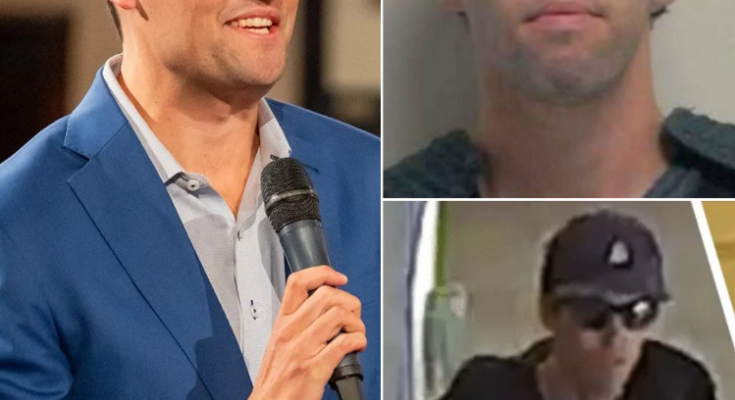On the evening of September 10th, the atmosphere inside Utah Valley University’s packed auditorium was electric. Three thousand people had gathered, their eyes fixed on the stage, waiting for Charlie Kirk—the 31-year-old founder of Turning Point USA and a close ally of President Donald Trump—to answer questions about mass shootings in America. Kirk, known for his combative style and unwavering conservatism, stood at the center of a political storm that had been brewing for years. But no one expected the tempest to break so suddenly, so violently.
As Kirk leaned into the microphone, ready to respond to a question about gun control, a single shot rang out. The bullet struck him in the neck, and he collapsed instantly. Panic swept through the crowd. The auditorium, moments before filled with anticipation, erupted into chaos. Within seconds, Kirk was dead, and America was plunged into a new chapter of political fear.
Two days later, after a nationwide manhunt and a deluge of public tips, the FBI announced the arrest of Tyler Robinson, a 23-year-old Utah resident. The details of Robinson’s capture were as dramatic as the crime itself: tracked down after a friend reported his confession to authorities, Robinson was apprehended without resistance. The arrest capped a frantic search that had gripped the nation and exposed the deepening fissures in America’s political landscape.
The Manhunt and the Evidence
Law enforcement wasted no time mobilizing after Kirk’s assassination. Security camera footage showed the suspect, later identified as Robinson, climbing onto the auditorium’s roof before firing a long-barreled rifle at the stage. He disappeared into the woods surrounding the campus, leaving behind a trail of biological evidence and the weapon itself.
But what truly shocked investigators were the inscriptions on several spent bullet casings found at the scene. Scrawled in shaky handwriting were messages both mocking and menacing: “Oh, Bella Ciao, Bella Ciao, Bella Ciao, Ciao”—a reference to the famous Italian anti-fascist anthem; “If you read this, you are gay, LMAO”; and “Hey fascist, catch!” The words were a chilling mix of internet-era irreverence and old-world political hatred, offering a glimpse into the mind of a killer who saw himself as both provocateur and revolutionary.
The FBI released surveillance images and a video of the suspect, offering a $100,000 reward for information leading to his capture. Within hours, social media was flooded with amateur sleuths analyzing footage, sharing theories, and speculating about the assassin’s motives. More than 7,000 tips poured in, and soon, the trail led to Robinson.
The Suspect: Radicalization and Motive
Initial investigations revealed that Robinson had recently adopted increasingly radical political views. Friends and acquaintances told reporters that he had become obsessed with left-wing activism, frequently criticizing Charlie Kirk and other conservative figures. His online activity included membership in Antifa-related Discord groups and the sharing of memes and posts mocking right-wing politicians.
Robinson’s transformation was emblematic of a broader trend: the radicalization of young Americans on both ends of the political spectrum. Experts have warned for years that social media, campus activism, and hyper-partisan news outlets have created echo chambers where extreme views fester and grow. Robinson’s case was a terrifying example of what can happen when rhetoric turns into violence.
According to law enforcement sources, Robinson had planned the attack meticulously. He chose a high-profile event, calculated the timing, and left behind messages intended to sow fear and confusion. His inscriptions on the bullet casings were not random; they were a manifesto, a declaration of war against what he saw as fascism embodied by Kirk and his allies.
The Political Fallout
Charlie Kirk’s assassination sent shockwaves through Washington and beyond. President Trump, visibly shaken, called it “a brutal assassination” and vowed to “restore law and order.” Utah Governor Spencer Cox compared the event to the political assassinations of the 1960s, warning that America was entering a dangerous new era.
Republican and Democratic leaders alike condemned the killing, calling it a direct threat to democracy. “Violence has no place in our politics,” said House Speaker Mike Johnson. “We must stand together against extremism, no matter where it comes from.” Across the aisle, Senate Majority Leader Chuck Schumer echoed the sentiment: “This tragedy is a wake-up call. We cannot allow political hatred to tear our country apart.”
But beneath the bipartisan outrage, old divisions resurfaced. Conservative commentators blamed left-wing rhetoric and campus radicalism for fueling the attack, while progressives pointed to the toxic climate created by years of polarization and inflammatory language from both sides. Social media became a battleground, with each faction claiming the narrative for itself.
America’s Political Crossroads
The assassination of Charlie Kirk was more than just a crime; it was a symptom of a nation at war with itself. For years, experts have warned that political violence, once rare in modern America, is becoming alarmingly common. The rise of armed militias, the proliferation of hate groups, and the mainstreaming of conspiracy theories have created an environment where violence feels inevitable.
Dr. Emily Rosen, a political scientist at Georgetown University, sees Kirk’s murder as a turning point. “We’re witnessing the breakdown of civil discourse,” she says. “When political opponents become enemies, violence becomes thinkable. America is at a crossroads—we can either recommit to peaceful debate or descend into chaos.”
Rosen points out that the attack on Kirk echoes the darkest moments in American history. The assassinations of John F. Kennedy, Martin Luther King Jr., and Robert Kennedy in the 1960s were not just tragedies; they were warnings about the dangers of unchecked hatred. “We learned then that democracy is fragile,” Rosen says. “We need to remember that lesson now.”
The Human Cost
Lost in the headlines is the personal tragedy at the heart of the story. Charlie Kirk was more than a political lightning rod; he was a husband, a father, and a friend. His family, shattered by grief, released a brief statement: “Charlie was passionate about America. He loved his family, his country, and his work. We ask for privacy as we mourn.”
For the thousands who attended Kirk’s events, his death was a gut punch. Many described him as fearless, willing to take on opponents with wit and tenacity. Others saw him as divisive, a symbol of the new conservatism that prizes confrontation over compromise. But all agreed that his murder was a tragedy—one that should never have happened.
Tyler Robinson’s family, too, is left to grapple with the aftermath. In interviews, relatives expressed shock and sorrow, insisting that they never saw signs of violence. “He was angry about politics, sure,” said one cousin. “But we never thought he’d do something like this.”
The Messages on the Bullet Casings
The inscriptions found on the bullet casings have become a focal point for investigators and commentators alike. “Bella Ciao,” the Italian song referenced, is an anthem of resistance against fascism, popularized by anti-Nazi partisans in World War II. By invoking it, Robinson was aligning himself with a tradition of revolutionary violence—a chilling reminder that the past is never truly gone.
The other messages—“If you read this, you are gay, LMAO” and “Hey fascist, catch!”—reflect the bizarre mix of internet humor and political rage that defines much of today’s extremism. Experts say that such language is designed to provoke, to mock, and to dehumanize. “It’s about creating chaos,” says Dr. Rosen. “It’s about sending a message that nothing is sacred, not even life itself.”
The National Reckoning
As the investigation continues, America is left to reckon with the meaning of Charlie Kirk’s assassination. Is it an isolated incident, or a harbinger of things to come? Can the country heal its divisions, or is it doomed to repeat the mistakes of the past?
Some see hope in the bipartisan condemnation of the attack. Others fear that the outrage will fade, replaced by the usual cycle of blame and recrimination. For Kirk’s supporters, his death is a rallying cry—a call to defend free speech and resist political violence. For his critics, it is a moment to reflect on the consequences of hatred and extremism.
The FBI has promised a thorough investigation, vowing to bring all those involved to justice. But law enforcement alone cannot solve the deeper problems that led to Kirk’s murder. As Dr. Rosen warns, “We need a national conversation about the value of democracy, the dangers of extremism, and the importance of empathy.”
The Road Ahead
In the days following the arrest, memorials for Charlie Kirk sprang up across the country. Candles, flowers, and handwritten notes lined the steps of Turning Point USA headquarters. At Utah Valley University, students held a vigil, calling for peace and unity.
But the scars remain. The assassination has left Americans shaken, uncertain about the future. Political leaders have called for calm, but the underlying tensions persist. The question now is whether the nation can learn from this tragedy—or whether it will become just another chapter in a long, dark history.
Tyler Robinson will face trial in the coming months. Prosecutors say they will seek the maximum penalty. But the true verdict will be rendered not in a courtroom, but in the hearts and minds of the American people.
Conclusion: A Nation at the Crossroads
Charlie Kirk’s assassination is a stark reminder of the fragility of democracy. It is a call to reject violence, to embrace dialogue, and to remember that political opponents are not enemies. As America mourns, it must also reflect—on the forces that divide us, and the values that unite us.
The messages left on the bullet casings are a warning. They tell us that hatred, once unleashed, is hard to contain. But they also remind us that every act of violence is a choice—and that every choice can be undone by compassion, understanding, and courage.
For now, the nation waits. For justice, for healing, for the chance to turn tragedy into hope. The road ahead is uncertain, but the stakes could not be higher. America is at a crossroads. The time to choose is now.

